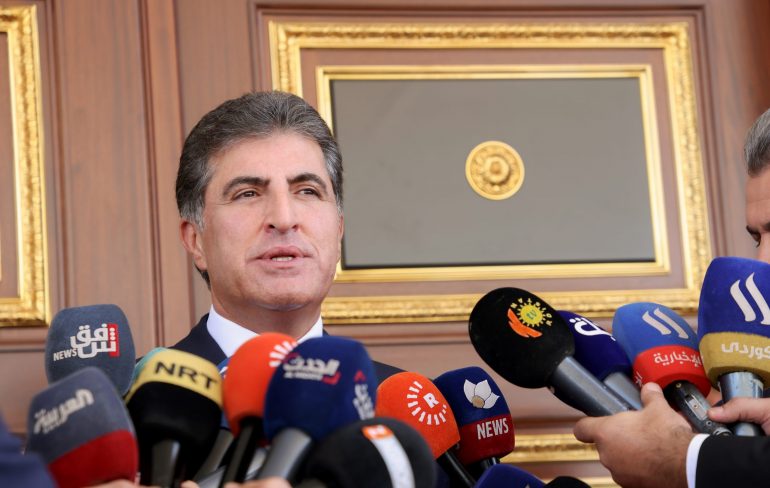In a post-meeting media huddle following talks with the Austrian Foreign Minister in Erbil, President Nechirvan Barzani of the Kurdistan Region took questions from journalists. A focal point of the discussion was the ongoing issue of salaries in the Kurdistan Region and measures being taken to address it. His party is under huge pressure within the Kurdistan Region and in the wider Iraqi political scene as salaries go unpaid for the third month running and Kurdish oil remains in the ground as exports via Turkey continue to be blocked.
Below is a transcript of President Barzani’s responses.
On salary delays and relations with Baghdad
“We have all made efforts; this is not a unilateral issue. Our Prime Minister is in constant communication with the Iraqi Prime Minister, as am I. This is a legitimate issue and concerns civil servants’ rights. The matter of salaries for the Kurdistan Region should not be conflated with other issues. The Kurdistan Regional Government has met all its obligations in accordance with the budget law and has acted with full transparency towards Baghdad. We expect Baghdad to reciprocate this treatment with the Kurdistan Region. Salaries are not a topic for debate; they are a right for the people of the Kurdistan Region as Iraqi citizens. The federal government must address this issue promptly. Our Prime Minister, Deputy Prime Minister, and Finance Minister will soon visit Baghdad, and we hope to resolve this and other matters through mutual understanding with Baghdad.”
The Kurdistan Region’s role in the Iraqi government and security matters
“This current government emerged from extensive dialogue involving all political factions in Iraq—the Kurds, Sunnis, and Shiites alike. We [struck] a formal agreement to be a part of this government, signifying our substantial role within it. Hence, we are committed to addressing issues through dialogue, as we are integral to the formation of this administration. These matters must be effectively resolved in Baghdad. The rights to salaries for employees of the Kurdistan Region are not negotiable; rather, they should be implemented as intended.
A security agreement between Baghdad and Tehran has been signed, and the Kurdistan Region, as part of Iraq, is committed to this agreement. We do not wish for the Kurdistan Region to pose a threat to any neighboring country. Not to Iran, not to Turkey nor any other country. In line with this commitment, significant steps have been coordinated and executed in cooperation with Baghdad. It is our hope that these actions will not result in any security or military issues. Personally, I see no justification for military intervention.”
On setting a new date for elections in the Kurdistan Region
“As you know, there was a problem with the elections, and after that, I have set the date for the elections. Now this issue is related to the Iraqi High Independent Election Commission, to which I have written a letter. We expect them to take practical steps to conduct the elections, and we are committed to this issue from all sides.”
Addressing questions about data transparency and broader issues with Baghdad
“No, it’s not accurate to say that the data—presumably on revenues and employee count—is flawed. The Kurdistan Regional Government has acted with the utmost transparency in its dealings with Baghdad. We urge that this issue not be conflated with political matters. The right to salaries for citizens of the Kurdistan Region is enshrined in the Iraqi Constitution. We expect the Iraqi Prime Minister, who serves the entire nation of Iraq, to resolve this issue promptly. Our issues with Baghdad extend beyond just salaries; we are also concerned with Article 140, which is of great importance to us, as well as the Sinjar agreement. Most crucially, the question remains: is Iraq to be a federal or centralized system? The existing arrangement with the Kurdistan Region does not reflect a federal approach. We hope to reach mutual understanding with Baghdad on establishing a federal system in Iraq.”
Discussing Peshmerga unification and international concerns
“The Peshmerga issue is a significant one, drawing considerable concerns, particularly directed at the PUK and KDP. The Americans are also concerned that progress is sluggish. While efforts have been made, the steps taken thus far to unify the Peshmerga forces have not been significant. We hope these efforts will intensify, leading to a unified force. The role of the United States is primarily one of mediation, aimed at resolving issues between the Kurdistan Region and Baghdad. Their involvement has been constructive in addressing these concerns.”
On his role in efforts to find solutions
“As it is my responsibility, yes, we will play our part. Everyone in the Kurdistan Region should contribute to resolving these issues.”
On the economic crisis facing the Kurdistan Region
“I don’t believe the Kurdistan Region has failed economically. Past instances show that significant work has been done in this area. While there are challenges, they should be addressed through dialogue. The Kurdistan Region has not faltered in this process.”
On the likelihood of visiting Baghdad
“As I’ve mentioned, the prime minister and deputy prime minister of the Kurdistan Region will visit Baghdad. Whenever necessary, yes, we will also visit. We are part of the geography of Iraq, and our visits to Baghdad should be considered routine. When the need arises to go to Baghdad, we will do so.”


